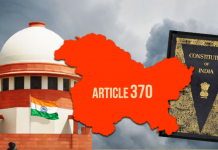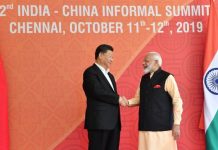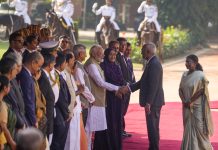 The passing of the Citizenship Amendment Act (CAA) has engulfed the subcontinent into turmoil. As protests as well as brutal repression of citizens continue, many issues emerge requiring debate and deliberations in the civil society making them informed citizenry. Philosophers since ancient times have dwelled upon the idea of citizenship and modern states continue to evolve their understanding of citizenship.
The passing of the Citizenship Amendment Act (CAA) has engulfed the subcontinent into turmoil. As protests as well as brutal repression of citizens continue, many issues emerge requiring debate and deliberations in the civil society making them informed citizenry. Philosophers since ancient times have dwelled upon the idea of citizenship and modern states continue to evolve their understanding of citizenship.
Angry protests flared up after passage of CAA along the nation after police action in Jamia Millia Islamia University and Aligarh Muslim University amid doubts and unaddressed anxiety among minorities especially Muslims. Student community continued its protests rocking the nation questioning real intension of the Modi government at the time when the whole country is facing worst economic crisis and resultant mass unemployment as a biggest challenge.
The BJP stalwarts remained ineffective to counter political moves of Congress Party over CAA and NRC but an outreach of Muslim scholar a luminary governor Arif Mohammad Khan gave strong defence in the support of CAA in the troubled political times of BJP.
 He became focal point once again at national scene when visibly upsetoverhisstand on CAA, the Congress party asked him to stay away from a function it organised to commemorate the role of former chief minister K Karunakaran, a prominent face in the politics of Kerala. Opposition leader Ramesh Chennithala formally requested the Governor not to attend the function paying the homage to former Chief Minister K. Karunakaran, a doyen of Kerala politics.
He became focal point once again at national scene when visibly upsetoverhisstand on CAA, the Congress party asked him to stay away from a function it organised to commemorate the role of former chief minister K Karunakaran, a prominent face in the politics of Kerala. Opposition leader Ramesh Chennithala formally requested the Governor not to attend the function paying the homage to former Chief Minister K. Karunakaran, a doyen of Kerala politics.
In such a scenario BJP found solace in the change of narrative emerged recently from a lecture rendered by Governor Kerala Arif Mohammad Khan at Nehru Memorial Museum and Library on“Citizenship institutional and civilizational,” wherein he highlighted the intricacies of the complex concept of citizenship.
Arif has also addressed a seminar in Varanasi on the subject. Stressing on the issue of granting citizenship to persecuted minorities under the new enactment he said, “Mahatma Gandhi was one of the proponents of the idea of giving shelter to non-Muslims facing persecution in Pakistan. National leaders like Pandit Jawaharlal Nehru, Dr Rajendra Prasad and Maulana Azad advocated the cause.”
“Today, it is being seen as communal, but there has always been a national consensus on the issue with (senior Congress leaders) Manmohan Singh, Ashok Gehlot and Pranab Mukherjee voicing their commitment to the cause,” He commented explaining the issue at length.
He said that beyond politics, citizenship in political theory can be viewed as institutional which can either be based on territoriality or ethnicity (beyond territory). But in fact citizenship is even more enriched if viewed from a deeper cultural and civilizational perspective. His lecture on “Citizenship Institutional and Civilizational”, opened up many perspectives and backgrounds with which the recent law needs to be looked at.
Tracing the subject back to 1947, he began by quoting Jinnah’s speech in the Pakistan Constituent Assembly that “now Muslims will cease to be Muslims and Hindus will cease to be Hindus”, not religiously but politically as “they will be Pakistanis with equal rights”. Jinnah after consistently maintaining for 10 years that Hindu and Muslims are different civilizations finally he realized that a country cannot be run on separatism unlike a movement. Even though Jinnah as a leader changed his mindset, it was too late to change the mindset of his followers who proactively shaped by him in the past 10years and therefore after the death of Jinnah the country failed to follow the change.
Elaborating conversation about Maulana Azad and his devotee Sorish Kashmiri in 1946, ArifMuhammad Khan says, that even before partition was announced, Maulana Azad had realized that not only Hindustan but Pakistan will also be divided wherein people will be asked to leave their houses.
Azad said, “Mein logo ko be-ghar kiyejane ke khilaf hoon” (I am against displacement of people from their land). Sorish Kashmiri discussed with Azad about his plan to leave Lahore and settle in Delhi but Maulana did not permit him to do so. Maulana Azad said, “If partition is to happen based on Hindu and Muslim population then what will be the natural barriers? No geographical feature exists to demarcate the terrain, no mountain, no river, no desert, only a line will be drawn but till when?”
Azad foresaw that nations which were built on so much hate would probably never be friends. He said that the land which Pakistan will be getting cannot accommodate all Muslims. He also explained how the nature of people living in western Pakistan is militant and situation can arise wherein it will be impossible for the Hindus to stay there. They will run from there or maybe be dragged out. But those who will be forced to leave home will be to save lives and honor and not for property.
Mr Khan then drew attention towards Gandhi writing on 17th July 1947, after the announcement of the partition. Gandhi, certainly not with any communal intent, wrote that the Hindus and Sikhs who are in Pakistan, if they do not wish to live there then without doubt they have a right to come to India. In this matter Gandhiji said that the government of India will be bound to provide habitation, employment and citizenship to them.
In fact soon after partition, Jawaharlal Nehru concerned about the separated brothers and sisters of India who could not celebrate independence assured them that they are free to come here and whenever they choose to come to India we shall accept them. Rajendra Prasad, first president of India in 1950 said that “we are keen to rehabilitate refuges, who are free to come to India and we will welcome them with open arms.”
The All-India Congress Committee on the November 25, 1947, stated that Congress is duty bound to provide complete security to non- Muslims of Pakistan who have crossed boundary to protect life and honor. But this needs to be looked in the wider context of persecution of minorities as Pakistan was consolidating itself as a rigid state moving forward on the communalist path shown by Jinnah.
Arif Mohammad Khan underlined how the 1949 objective resolution passed in Pakistan asserted itself as a Muslim state. But Pakistan’s Muslim laws were at variance with Quran as Prophet Mohammad himself said that there is no compulsion to anyone to follow any law blindly. We cannot impose homogeneity on society as diversity is the law of nature.
He narrated another engaging story of J.D. Sethi an officer in the textile department of Moradabad who migrated to India from Lahore during partition. J.D. Sethi re-visited Pakistan and arranged a meeting with ParvezMussaraf. On meeting Mussaraf he said “I have four doctors at my home- my two sons and their spouses, if partition would not have happened then they would have been serving their own people.” Arif recalled how he pinched J.D. Sethi when he narrated this encounter with Mussarafto him by asking, “Don’t you take us as your own people,” only to realize the complex ways in which people remain tied to their native land.
JD Sethi replied, “If Muslim state had to be formed, then so be it, we just have had to give them Jaziya tax but have stayed in our native land.” “Vaisetoh Raja Badalte the, 1947 meintohPraja hi badaldiya”- “It was the kings who used to change, but in 1947 something unheard happened when the citizens were changed.” Arif Mohammad Khan stresses over these lines, and urges people to understand with utmost sensitivity the issues of nativity and citizenship, learning a lesson from our own past.
Arif Mohammad Khan then brings on the discussion to the Schedule caste minorities during the partition who were forcibly stopped from fleeing from Pakistan to provide lavatory cleaning facilities. He explains how the Ashraf or the elite Muslims were frightened to lose their privileged position at the advent of democracy and were responsible for holding back minorities in Pakistan after partition.
After the objective resolution in Pakistan to declare it an Islamic state was passed. Christian missionaries approached minority dalits, convincing them to convert to Christianity to escape persecution. Arif Mohammad stressed how unlike India, Pakistan had no laws to safeguard discrimination. Pakistan’s extremist path continues to impact India in Kashmir. And the nature of Pakistani state in fact was such that Jinnah’s law minister J.N. Mandal was disillusioned by the government and flee to India before offering his resignation.
Arif Mohammad Khan then brings attention to recent law passed by the parliament, deliberating whether we can open citizenship for all. The Sanatan Tradition of India conveys that divine dwell in all. But is it possible to welcome all? He questions. We can’t even accommodate all persecuted minorities for instance Syrians or Yemenis. But this law, Arif
Mohammad explains is for those persecuted minorities to which we made a commitment to grant citizenship.
“Who introduced NRC? In 1985, the (Assam) Accord was signed with the (AsomGana Parishad) AGP leaders. Who had then extended it to the national level? In 2003, Clause 14 was added, and NRC which was to be prepared for Assam was extended to the national level. Who did it? In 2009, Chidamabram saw that the law was not strong enough and hence, Rule 4 was added to strengthen it. Who is responsible?”
Having said that, there is no country in the world which does not have a register of its citizens, Khan added. Regarding the nationwide protests over the issue, the governor said, “A picture has been painted as if other than those listed, nobody would be given citizenship. The move will deal with the particular subject, with those who have been made to flee because of their religion. Each case will be decided on own merits, but these people (persecuted minorities) as a class, a commitment was made to them in 1947 and it is understandable that they were victims of a demand that they never made. They were victims of a system that was created against the assurances given to these people.”
Both the Congress and the Left strongly criticised the Governor for supporting the Citizenship Amendment Act, with the Congress saying the Governor had ‘stooped to the level of a BJP spokesperson.’ K Muraleedharan, Vadakara MP and son of K Karunakaran, also attacked the Governor ‘for not acting with the dignity that the post demands.’ He had also said that if the Governor continues to justify the Citizenship Amendment Act, they would be prompted to consider boycotting him. They alleged that his views are based on distortion and congress never favoured citizenship on the basis of religion.
Arif Mohammad Khan, an alumni of Aligrah Muslim University, where students suffered fatal injuries during protests over CAA. Arif has always been known for his free and frank stand on contentious conflicts. Hequit the Rajiv Gandhi government opposing his stand on reversal of Shahbano judgement of apex court by way of enacting a fresh law just to appease minorities’ community.
letters@tehelka.com













